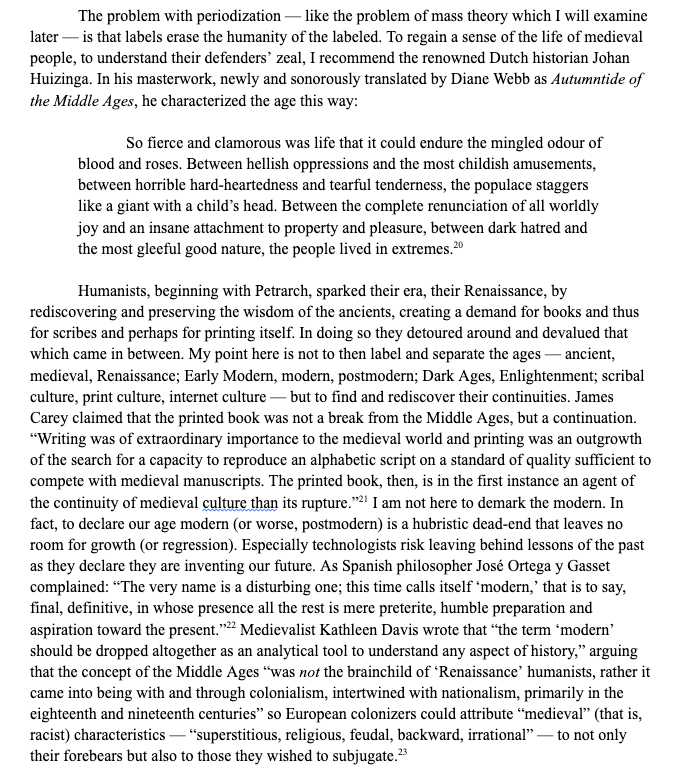I’ve been thinking about Matt Mullenweg’s response to Brian Armstrong’s response to Moxie Marlinspike’s excellent post about Web 3. I have some responses in return in this post based on a thread. tl;dr: I think Matt + WordPress provide much of the model Moxie seeks at the end of his post.
People seem to be redefining Web 2.0 as Facebook, etc, that own data, but Web 2.0 at the time was platforms like WordPress, Odeo, Six Apart, Flickr, Technorati, and https://t.co/vlhR5g6fkg that had open data and interoperated. https://t.co/PXuZBaLbP2 https://t.co/KoDPTdZhN3 pic.twitter.com/sJJT8kyaJG
— Matt Mullenweg (@photomatt) January 9, 2022First, let me say I don’t give a rat’s rump what is called Web 1, 2, or 3. They are all hubristic labels based on the ego of the present tense. This might be web .000002. As I often say, it’s 1475 in Gutenberg (Johannes, not WordPress) years.
A key lesson I came to writing my book (still out with a publisher) on the (Johannes) Gutenberg Parenthesis is that it took a century and a half before groundbreaking innovation came *with* print: the newspaper, the modern novel, the essay (Montaigne), a market for printed plays.
So what interests me about Web N is not what goes *into* it in terms of technological innovation — that will come — but more so what comes from invention *with* the technology, once the tech becomes easy, assumed, boring.
What strikes me is that WordPress — blogging then — is a *with* not an *into* institution because it allows people to create WTF they want. It makes the technology easy & boring. It allows creators to surprise us with their creations for their own sake, not technology’s.
Right there is a model for Moxie’s Web 3: ease. Creating NFTs: not easy, not cheap. Creating on WP: easy, cheap, thus fast and open.
Of course, WordPress *is* a creation tool. There are others. But what sets it apart — what set it apart when it won out over Movable Type — is its open-source architecture decreed by Matt: The underlying code is open; anybody, including Matt, can build services atop it.
I remember when a Polaris VC scratching his head over Matt’s open-source architecture called me to ask whether it was insane to invest. No! I said. I explained why WordPress would win over Movable Type because of it. The software would spread and improve at the same time.
In this structure, Matt merely has a first-mover advantage in building his services. This is why I am also excited by Jack Dorsey’s proposals for Bluesky, making the speech layer a commodity so innovators can build value-added layers we need (e.g., recommendation, authentication).
So now (at last) to the point re Moxie: In the end, the post calls for:
1) “We should accept the premise that people will not run their own servers by designing systems that can distribute trust without having to distribute infrastructure.”
In a sense, doesn’t WordPress at least display a model for meeting criterion #1 through open source: multiple instances create a sort of distributed architecture?
Moxie’s second wish:
2): “We should try to reduce the burden of building software.”
Here, too, doesn’t Matt’s WP at least demonstrate a model through its object/block-oriented creation tools (not of software, but of creation *with* software)?
All this is to say that we’re not making a clean progression from Web 1–2–3 but instead trying to clean up what was done in Web .0000012. We return to Web 1 to deplatform it through a worldview that is already well proven: open source. I *know* that’s simplistic.
My point is that it’s just as dangerous to think that Web 3 is an advance on Web 1 & 2 as it is to think that Medieval years were Dark Ages and that the Renaissance was progress and that we are modern. That’s the greatest hubris of all. Perspective matters.
In writing about the Gutenberg Parenthesis, I learned the dangers of periodization, for in dismissing what came before, we lose the opportunity to build upon it. This is why I despise journalism’s conceit of the “first draft of history,” thus ignoring history. (By the way, from the MS:)

The reason I’m thinking so much about this is that I’m teaching a course in Designing the Internet next month with Douglas Rushkoff. I’d love to assign Moxie’s post that launched a thousand threads, though I fear the technology might be intimidating to students.
Then I see that’s Moxie’s point: People don’t want to run servers. They don’t want to become fluent in something called Web 3. They want to build *atop* not *in* (that is, not in a walled platform). Making tech complex as a prereq is the equivalent of having to run servers.
So I might well assign the post but also assign Matt’s thread because it brings historical perspective on the building of the web and demonstrates the whole point of the course: that students have the agency & responsibility to build the future of the net.
Of course, Matt sums it all up better than I can:
Anyway the most interesting conversation to me is how to make all the new stuff as user-friendly as possible without recreating the same centralized bottlenecks and gatekeepers.
— Matt Mullenweg (@photomatt) January 9, 2022The post Web .0000012 appeared first on BuzzMachine.
